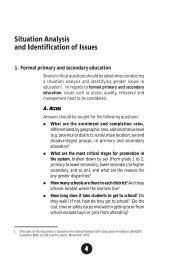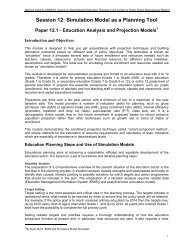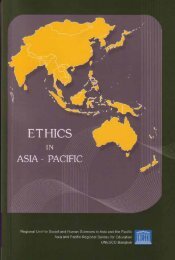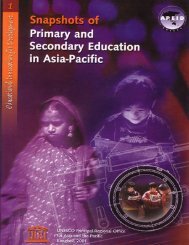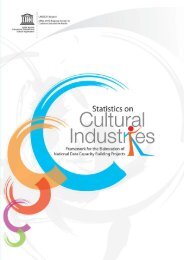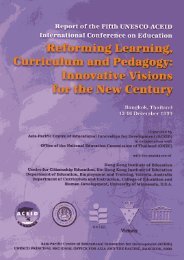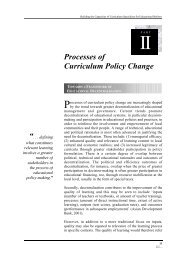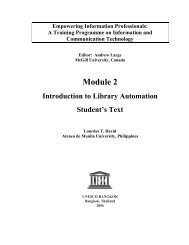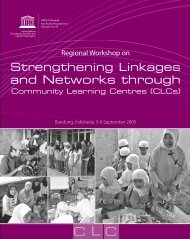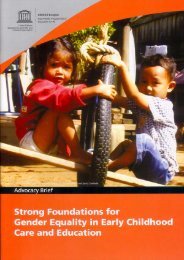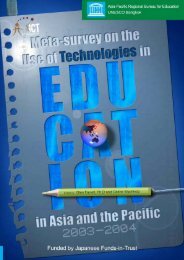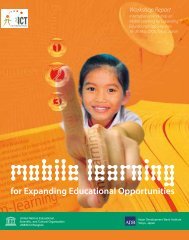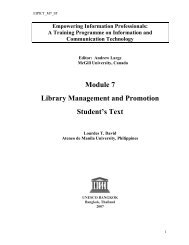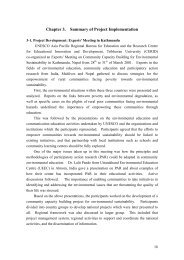Conclusion and Implications
Conclusion and Implications
Conclusion and Implications
You also want an ePaper? Increase the reach of your titles
YUMPU automatically turns print PDFs into web optimized ePapers that Google loves.
<strong>Conclusion</strong>s <strong>and</strong> <strong>Implications</strong><br />
1. Many countries in the region reported of having developed a<br />
policy <strong>and</strong> master plan on teacher training on ICT. Yet these<br />
plans still need to be looked into more carefully to link them<br />
to the broader ICT for development <strong>and</strong> education goals –<br />
they need to be updated, encouraging a movement from<br />
developing basic computer literacy competencies to ICTintegrated<br />
teaching/learning. Many countries are realizing that<br />
they have developed their ICT in education policy from the<br />
technology perspective <strong>and</strong> underst<strong>and</strong> the need to revise<br />
<strong>and</strong> overhaul the policy from the pedagogy-based<br />
perspective.<br />
2. There is a clear need for countries to formulate their basic<br />
st<strong>and</strong>ards/benchmarks <strong>and</strong> ICT competencies for teachers,<br />
managers <strong>and</strong> students that can serve as a basis for<br />
developing teacher training programmes on ICT.<br />
3. While basic computer literacy <strong>and</strong> software applications need<br />
to be taught to teachers <strong>and</strong> other professionals, they should<br />
be offered as an integral part of the teaching <strong>and</strong> learning<br />
process or as pedagogical tools rather than as applications<br />
per se. Countries should now start moving forward in<br />
developing their training courses to focus on the development<br />
of skills in the pedagogy-based <strong>and</strong> integrated use of ICT<br />
into the subject curricula <strong>and</strong> classroom teaching.<br />
4. Intertwined with the need for training programmes to focus<br />
on the development of skills in the pedagogy-based <strong>and</strong><br />
integrated use of ICT into teaching is the corresponding need<br />
to build a critical mass of trainers in the countries that have a<br />
mastery of knowledge <strong>and</strong> skills in this area.<br />
5. Training programmes should always start with an introduction<br />
of the rationale <strong>and</strong> purpose of using ICT in teaching/learning,<br />
the role of teachers in the new ICT environment <strong>and</strong> how<br />
they can benefit from the use of ICT, even before the technical<br />
aspect is given. Experience in certain countries has shown<br />
that without the motivational push, teachers do not bring back<br />
what they have learned into classroom application.<br />
33<br />
Overveiw from Selected Countries
34<br />
Teacher Training on ICT use in Education in Asia <strong>and</strong> the Pacific<br />
6. The issue of whether troubleshooting <strong>and</strong> technical maintenance<br />
should be included in the training of all teachers or only given to<br />
selected key teachers needs to be considered more carefully.<br />
7. The value of training principals <strong>and</strong> headmasters together with<br />
the teachers (but on a different stream) is beginning to be<br />
recognized in many countries in the region <strong>and</strong> practiced by a<br />
few. This trend should be replicated <strong>and</strong> exp<strong>and</strong>ed to other<br />
countries as well.<br />
8. Similarly, extending the training facilities <strong>and</strong> programmes to the<br />
community, such as to the parents, can benefit school-based<br />
programmes in terms of support to both teachers <strong>and</strong> students.<br />
This approach also provides access to resources that can help<br />
improve community life.<br />
9. There is now a growing body of tested training modules <strong>and</strong><br />
materials that can be replicated or adapted by countries planning<br />
to implement new training programmes. The issues of sharing,<br />
copyright <strong>and</strong> open source need to be addressed to break the<br />
barriers that prevent the poorer countries or marginalized areas<br />
from tapping into this wealth of resources.<br />
10. The inventory of teacher training on ICT programmes initiated<br />
by UNESCO should go beyond profiling into serving a clearing<br />
house <strong>and</strong> depository of actual copies of training modules <strong>and</strong><br />
materials on ICT.<br />
11. Best practices <strong>and</strong> lessons learned in teacher training/<br />
professional development on ICT should be documented in a<br />
more in-depth manner, as it is more cost-effective <strong>and</strong> wiser to<br />
learn from other countries’ experiences which have pioneered<br />
in this area <strong>and</strong> have accumulated lessons learned, rather than<br />
starting from zero.<br />
12. The huge amounts of resources invested in teacher training<br />
programmes will only pay off if teachers go back to their schools<br />
with continuing support in terms of facilities/equipment,<br />
connectivity, appropriate software installed, materials <strong>and</strong><br />
technical <strong>and</strong> help-desk support.<br />
13. Countries should now start venturing out into gradual use of<br />
online learning combined with the face-to-face mode of delivery<br />
– selecting parts of the training programme that can easily be<br />
implemented online.
14. To enable countries to learn from each other, especially those<br />
less advanced countries learning from the more developed<br />
ones, attachments <strong>and</strong> study visits should be considered.<br />
15. To enable countries to have equal access to the wealth of<br />
training resources that are beginning to grow, digital/electronic<br />
copies of these should be made available on the Internet as<br />
open source, gathered by UNESCO through a Web-based<br />
clearing house.<br />
35<br />
Overveiw from Selected Countries



